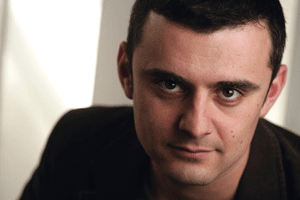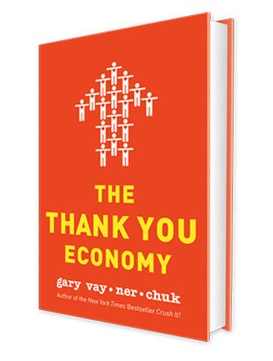Gary Vaynerchuk is nuts. Nuts in a good way that makes you feel both envious and lazy at the same time. With insurmountable reserves of passion and purpose, his very being embodies what this social media thing is and how it works. However, in his book The Thank You Economy he quickly points out that social isn’t simply ‘media.’ It’s a cultural shift in how we used the biggest platform ever invented — the Internet.
It’s also cultural because it deals with how we think and and act, more than technology. While you may not be able to care to the point of answering tweets “until your eyes bleed” like Gary Vee, this book helps you understand why you should seriously consider that.
The Elevator Pitch
The Thank You Economy isn’t a World Is Flat-esque treatise on the state of global economics — though it does impact that. Rather, it’s a dissection of what social media really is, which is a human thing. When you succeed in social, the book states, it won’t be because you mastered a particular platform. It will be because you embraced the cultural shift taking place.
A quick note — I listened to the audiobook of The Thank You Economy while traveling recently. I am a firm believer that the right book read the right way is an even more amazing experience than just reading a book. Many times the author is that ideal voice. Anyone who’s ever seen Gary speak, knows that he delivers (another one who reads with enthusiasm is Mr. Duct Tape himself, John Jantsch). As such, many times during the audiobook he declares that he’s “going off-script” to add further insight, updates, and anecdotes. In most cases, the content is the same from book to audiobook but in this case you get much more by listening.
The BIG Ideas
So what are these cultural shifts that Vaynerchuk espouses in The Thank You Economy? Like the author’s rapid-fire speaking, the book is chocked full of actionable insights. Here’s a quick tasting of what Thank You has to offer.

Gary Vaynerchuk
It Started with a Coupon — The book kicks off with a story from Gary’s wine shop with an employee not honoring a customer’s coupon. In addition to losing the customer with this service snafu, this vignette provides a teaching moment on the core tenants of The Thank You Economy. Again, regardless of platform, social gives us a historic opportunity to scale care.
Understanding the Past — Our grandparents — the greatest generation — understood why caring mattered in business and the impact of word of mouth. This history lesson is valuable as it helps us understand the evolution of caring in business. The ’80s and ’90s marked the “customer service” dark ages when businesses (especially chains) grew so big and impersonal that relationships suffered. Social gives us an opportunity to right that wrong.
Manners Matter — Social does this by marking the return of manners in many ways. Holding doors, conversing, and, of course, saying thank you. Scaling care like this allows us to “leave no interaction behind” and “treat every customer like a big spender.”
Solving Problems — The best way to be relevant to your community is solving problems. As Gary says, “if you aren’t solving problems for people you’re a goner.” Conversely, if you try to close too early you’ll be met with the success of a 19-year old dude on a first date (Gary delivers this much better).
Marathon Man — A phrase Vaynerchuk uses many times throughout the book is the fact that social media marketing is a marathon not a sprint. Too many companies give up on social too soon because they sprinkled a little bit of social on a finite campaign and weren’t pleased with the results (the ‘social campaign’ being a construct Gary wisely questions). Social is a long-ball game. You have to plant seeds and nurture them over time.
Need for Speed — The Thank You Economy also makes a strong case for adapting quickly. This is again where Gary’s real-world experience offers an effective case study. As he notes, “if you wait for your competition to do social well, you’ll lose whatever advantage you would have had.” Your business won’t die tomorrow if you don’t start using social media. But the longer you go without building a community and starting conversations the greater the chances that your brand will decrease in value.
The Two Sections You Can’t Miss — First, in advocating for organizational change, Vaynerchuk wisely anticipates every road block you will get hit with (ROI, legal, etc.). He then dissects each and arms you with answers to push back to the brass. A surprisingly good chapter on traditional media integration is also worth the price of admission.
Fresh, Practical Case Studies — The examples cited in The Thank You Economy are effective for two reasons. First, they clearly walk though relevant challenges social businesses will face as they adapt. Second, they are fresh examples from many businesses and brands you probably haven’t heard of. This is nice as many of the same case studies crop across social media tomes. Even when he cites a trendy example like Old Spice, he is quick to expose flaws as well.
It Takes Culture to Change Culture — Like The Now Revolution, The Thank You Economy spends a considerable amount of time advocating for creating the right internal culture that fosters innovation and change and, most of all, empowers your people.
So, Should You Read It?
 Gary is different than other talking heads because he walks the talk — he’s done all of this himself. He has stories from brick and mortar businesses that he’s rebuilt click by click. Moreover, he’s passionate about it and you can’t fake that. It also hits home with me because he reshaped an existing business with the support of his father, the founder of that business, which is not unlike my story.
Gary is different than other talking heads because he walks the talk — he’s done all of this himself. He has stories from brick and mortar businesses that he’s rebuilt click by click. Moreover, he’s passionate about it and you can’t fake that. It also hits home with me because he reshaped an existing business with the support of his father, the founder of that business, which is not unlike my story.
That’s not to say every word is golden and uncontroversial. He all but advocates for the wholesale replacement of market research with social media. While I understand and often oppose the dominance and skew market research can promote, I see social as more consistent and complimentary. He also gives a eulogy for email marketing on a number of occasions and that’s simply not the case. However, the strong statements are what make The Thank You Economy both an insightful and an entertaining read.
A core tenant in The Thank You Economy is being authentic. Gary leads by example here too. At the end of the book he provides his personal email and encourages you to get in touch with him. If you sense that what’s happening around us is more of a cultural shift that you need to prepare your business and brand for, then The Thank You Economy is a must read (or a ‘must listen’ in the case of the audiobook). From the struggling marketing director, to the agency working to adapt, to the C-suite executives leading the way, all need to better understand the future Vaynerchuk sees so clearly.

